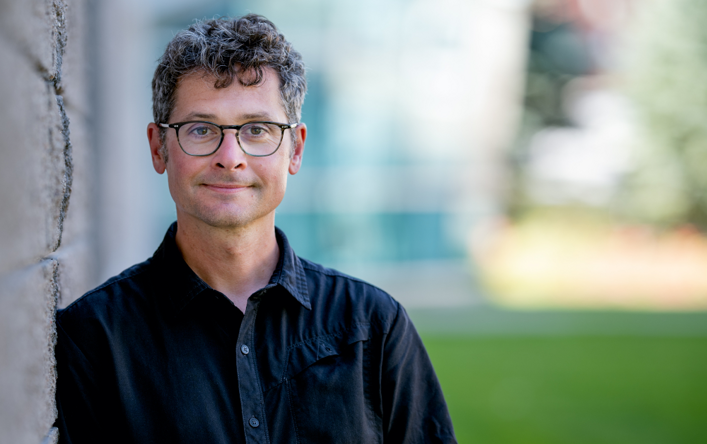Message from the President

Dr. Mark C.J. Stoddart University
Canadian Sociological Association President 2025-2026
Message History:
Hello everyone, bonjour à toutes et à tous,
 I write this in early February from the Arctic Frontiers conference at 70o N in Tromsø, Norway, where the Arctic sun has recently begun its return, peaking over the mountains and fjord of this beautiful place, which is part of traditional Sápmi territory. The conference draws together a vibrant mix of cross-disciplinary researchers, representatives from Sami, Inuit, and other Indigenous communities; governments and municipalities; NGOs; and businesses from across the Arctic for discussions of this complex region and important region. Here, I would like to share three main points that have stuck with me this week that I think are relevant to our work as Canadian sociologists:
I write this in early February from the Arctic Frontiers conference at 70o N in Tromsø, Norway, where the Arctic sun has recently begun its return, peaking over the mountains and fjord of this beautiful place, which is part of traditional Sápmi territory. The conference draws together a vibrant mix of cross-disciplinary researchers, representatives from Sami, Inuit, and other Indigenous communities; governments and municipalities; NGOs; and businesses from across the Arctic for discussions of this complex region and important region. Here, I would like to share three main points that have stuck with me this week that I think are relevant to our work as Canadian sociologists:
First, the importance of Canada as an actor in the Arctic world was repeatedly emphasized. It took less than 10 minutes on the first day of the conference for someone to invoke Mark Carney’s recent Davos speech. This was brought up in the context of the need for renewed commitments to international collaboration as a response to this period of rupture that is signified by — among other events — the attempts of great powers to dictate the future of Greenland. Conversely, however, another vital mainstage moment occurred when Natan Obed (President, Inuit Tapiirit Kanatami), provided a critical intervention and reflection on implicit notion that Canadian diplomacy does not require meaningful consultation with Indigenous communities. He argued that we need to push back and define new ways of thinking about the nation state and sovereignty, especially when Canadian diplomacy attempts to speak on behalf of Indigenous communities and territories on the global stage.
Second, security was the dominant discourse of the event, with a major focus on the ongoing challenges posed by Russia and the United States. However, approaching this event as a sociologist through the lens of event ethnography illuminated three distinct articulations of the security discourse. An internationalist discourse framed security as created through increasing scientific and political collaboration based on commitments to democracy and the international rule of law. A northern regional discourse framed security as created through maintaining thriving northern communities that are economically, socially, and environmentally sustainable, where security is ensured through having livable northern communities that people want to live, stay, and move to. An Indigenous discourse emphasized that security also must be based on procedural justice, with meaningful and inclusive engagement in determining the future of northern places, where Free Prior and Informed Consent is respected and ensures the continuity of social-ecological relationships and practices. As Camilla Aviaja Olsen (Head of Section, Ministry of Foreign Affairs and Research, Greenland) beautifully put it, this view of security is about “maintaining serenity on the land.”
Third, at a conference where social scientists were often outnumbered by STEM-oriented researchers, I had a remarkable number of conversations about the increasing recognition for the need for more sociology/social science to help navigate the complex dilemmas involved in trying to simultaneously pursue goals related to geopolitical security, Indigenous rights, community economic and social sustainability, climate action and energy transitions, and nature protection. There is increasing recognition that there needs to be more community-oriented research on these issues, as well as research that cuts across siloed issue areas and sectors. For me, one of the strengths of sociology has long been its commitment to holistic thinking across political, cultural, and economic domains. This type of holistic thinking positions us very well to help address these pressing societal challenges.
In closing, I look forward to meeting many of you in Halifax in a few short months for our Conference, Harbours of Hope: Sociology in a Divided World. I am pleased to report that we received 970 abstract submissions, which is comparable to our 2025 conference at George Brown University. It is great to see the enthusiasm for our gathering at Dalhousie. There is also a high level of interest and commitment in our virtual session (with over double the number of abstract submissions from 2025), which reflects the ongoing value of our dual online-in person conference format to ensure accessibility and inclusion.
Greetings everyone,
As the days grow shorter and the weather turns wintry, I hope this message finds you well — enjoying the final stretch of the Fall semester and looking forward to a well-earned winter break.
It’s hard to believe we’re already deep into planning for our next annual CSA conference, which will take place at Dalhousie University and online this coming June. I’ve had the pleasure of working with an outstanding Local Organizing Committee and Program Committee, and together we’re shaping an exciting program that’s both nationally relevant and deeply connected to Dalhousie and Atlantic Canada.

We received a record number of session proposals this year — a sign of the enthusiasm across our membership for returning to Atlantic Canada for the first time since 2011, and to Dalhousie for the first time since 2003. Many proposals engage directly with our conference theme: Harbours of Hope: Sociology in a Divided World. I’m especially looking forward to hosting a thematic panel that will showcase sociological scholarship from both senior and emerging scholars across the region.
We’re also honoured to feature Dr. Amal Madibbo’s plenary talk, celebrating her Outstanding Contribution to Sociology Award — an event not to be missed.
Through both our in-person and virtual formats, I’m excited for the rich, collegial, and constructive dialogue that awaits us. This year’s conference invites us to reflect on how sociological research can be solutions-focused and contribute meaningfully to social-ecological wellbeing — broadly defined — while remaining grounded in critical analysis.
The call for paper proposals opens shortly, and I warmly encourage you to submit your work. Let’s build a vibrant and diverse program together. I look forward to engaging with many of you in Halifax and online.
Finally, if you haven’t seen it yet, I’d like to highlight a recent ASA Contexts special section: Canada and the United States: A Friendship Strained. It features guest essays by CSA Past-President Liam Swiss (Acadia University), Pallavi Banerjee (University of Calgary), and David Tindall (UBC) on the changing nature of the Canada-U.S. relationship since the re-election of President Trump.
Greetings everyone, bonjour à toutes et à tous,
First, I want to open by acknowledging that we continue to live through times of heightened anxiety where it seems like new conflicts and crises are continuously emerging. I know that many of our membership are experiencing anxieties for themselves, as well as for family, friends, relatives, and other loved ones around the world. My thoughts are with you during this time.
Second, I’ve recently had the privilege of attending the International Sociological Association World Forum in Rabat Morocco – the first time a major ISA conference took place in the MENA region, and only the second time in Africa.

City of Rabat, Morocco
Site of the 2025 ISA World Forum.
A good portion of the conference saw critical interventions into the discourse of the Anthropocene – the notion that we inhabit a new era defined by human intervention in ecological systems. There was a great deal of discussion of how sociologists can critically contribute to the Anthropocene discourse with its origins in earth sciences. We can help centre issues of power and inequality and amplify the voices of marginalized communities whose experiences are not reflected in the abstracted, depersonalized figure of the Anthropos – “humanity” writ large as an agent of social-ecological change. We also heard repeated challenges to the mainstream of sociology to listen and learn more from colleagues and communities in the global south.
It was great to see high levels of participation and engagement of CSA members from universities right across the country. I’m glad I had a chance to run into several members on-site. I appreciate the commitment shown by CSA members to the sometimes challenging — but invaluable — task of building international sociological dialogues and epistemic communities. Engaging in such global dialogues with a spirit of openness and humility is increasingly important in our current period where political, public — and even academic — discourse too easily slips into polarization and othering those we disagree with. I hope we will continue to see similar levels of engagement in the next ISA World Congress, scheduled for July 2027 in Gwangju, Korea.
Third, I want to thank our vibrant membership for the excellent recent conference at George Brown College in Toronto. As the first CSA meetings held in a college setting, the conference theme “Committing Sociology for Social Impact” was highly relevant and timely. In the end, we held 292 in-person sessions and events as part of Congress, plus an additional 53 sessions in our virtual conference. This included 680 in-person and 132 virtual paper presentations. As we look towards piloting “life outside Congress” for our next annual conference, I look forward to co-creating a high-quality and inclusive program for next year.
Fourth, let’s congratulate our well-deserving 2025 Award Recipients, including awards for publications, early career scholars and students, applied sociology, and outstanding service. I particularly look forward to hearing Dr. Amal Madibbo’s Outstanding Contribution to Sociology Award plenary talk at next year’s conference. I hope CSA members will continue to forward excellent nominations for our suite of awards.
Fifth, I want to thank our outgoing Executive Committee and Subcommittee members, as well as our newly elected 2025 Executive Committee, Subcommittee, and Caucus members. At a time when so many of us feel the strain between competing research, teaching, and service commitments, I deeply appreciate that you’ve dedicated your valuable service time and energy to the CSA.
Lastly, let me close by calling back to Prof. Howard Ramos’ recent Outstanding Contribution to Sociology Award talk at George Brown College. One of his reading recommendations was Vine Deloria Jr.’s The World We Used to Live In. Taking this up, I came across the following passage that provides a compass for a Sociological practice that is open, curious and in awe of the worlds we research and are embedded within:
"The substance of the universe is relationships, the symmetries and their structure ...” (Deloria Jr., 2006, p. 201).
With thanks, avec gratitude,
Mark.
Meet the Full Executive Committee
